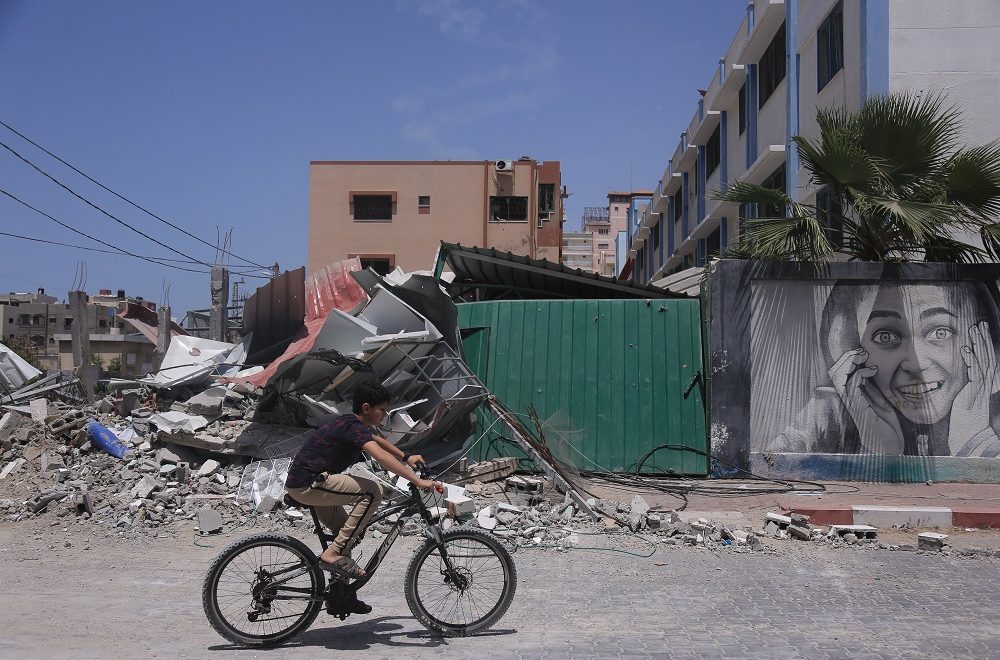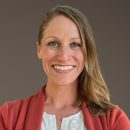One evening this month, as I was home in my mostly quiet Denver neighborhood, a loud motorbike drove by. I was temporarily filled with rage at the idea that this noise might wake my baby, who had just fallen asleep. It only took a moment for sadness, embarrassment, and horror to wash over me as I recalled an image of a Palestinian baby, younger than my own, with burns all over their body, fighting for their life in a hospital bed.
In another time, another place, my child would be the one whose life was utterly discounted, and who was seen as not only expendable, but a stain on his society. In fact, that’s not hard to imagine, as my baby’s very existence depends on his Jewish great-grandmother’s escape from Germany in 1938.
The parallels between the Holocaust and the current-day ethnic cleansing of the Palestinian people feel so obvious to me. It is undeniable that the victim has become the perpetrator under the guise of preventing their own further persecution. The irony is right there in plain sight.
The reason for this is no mystery: Unresolved trauma sustains the cycle of violence. As one psychological study shows,
“Violence produces trauma. Trauma produces rage. Rage produces hatred. Hatred produces antisocial, violent, terrorist behavior. Victims create other victims. It is an unquenchable circle of fire that fuels itself.”
We all know that the Jewish people have themselves been oppressed, displaced, discriminated against, and murdered. Epigenetics has taught us that this intergenerational trauma gets passed down, and lives on within the bodies of new generations. Yet it is for exactly these reasons that Jews in Israel and around the world must help break this cycle of trauma.
As with so many religions, Judaism is filled with stories and traditions meant to remind us of important lessons. My favorite holiday is Passover, in which we recall the story of Moses, who guided the Israelites out of an ancient land and out from under the reign of an oppressive Pharaoh. Moses asked Pharaoh over and over again to let his people, who were enslaved, go free. When Pharaoh refused, the 10 plagues rained down.
I find Passover to be such a meaningful holiday because of the way it can be interpreted in the present day. It doesn’t take a stretch of the imagination to put the Palestinian people in the shoes of the ancient Israelites. For decades, they have been persecuted by a modern-day Pharaoh, abetted by unconditional military aid from the United States. Every year, when we celebrate Passover, Jewish people must remind ourselves that we are witnessing the re-enactment of this ancient story, only it is the state of Israel, which claims to represent us, that has become the Pharaoh.
Jews have unquestionably suffered as a people. What is done with that suffering is now the question. The state of Israel can take Jewish suffering and make others suffer because of it, denying human rights out of fear; or take that suffering, turn it into compassion and justice, and use it to ensure that never again does anyone experience such evil.
I believe that as Jews, we must use our collective suffering to practice chesed, or lovingkindness, and offer compassion and humanity to all people. That is the legacy I want my people to be known for. That is the world I want my child to grow up in. And that is the work I will continue to do in support of freedom for the Palestinian people.
Meredith Slater is a new mother and the Director of Development for ActionAid USA. ActionAid works in Palestinian communities, including those near the border with Israel that have been most directly affected by the violence. Our women-led response is supporting the most vulnerable and marginalized individuals and communities with food, medicine, shelter, counseling, and more.

